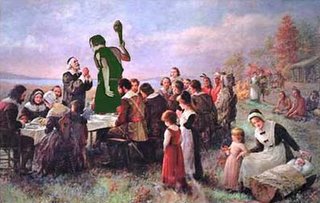
Terrific Thanksgiving
Thanksgiving seems to be a terrific holiday. Three categories can be associated with the word thanksgiving: lies, ethnocentrism, and dummy following. Every year, this particular holiday promotes the aforementioned nouns. Since thanksgiving perpetuates those things, it is reasonable to say that it is a terrific holiday.
Lie. Most people are perceive the first thanksgiving as an amicable holiday through its roots. Most people know this history:
“In 1621 The Pilgrims and the Indians sat down and had a nice, friendly meal together. No fighting was allowed on that day. Everyone sat down at the
Unfortunately, Richard J. Maybury finds this as a far cry version from the truth. He writes: “The problem with this official story is that the harvests of 1621 was not bountiful, nor were the colonists hardworking or tenacious. 1621 was a famine year and many of the colonists were lazy thieves.”
Carol Barbieri would seem to support what Maybury posits. She states: “The first winter for the Pilgrims was devastating. Of the original 102 Pilgrims who came to
This is one of the many lies that the Thanksgiving holiday perpetuates and proliferates. Every year, people would engage in such lie and consider it to be true. Since thanksgiving perpetuates lies, it is reasonable to say that it is a terrific holiday.
Ethnocentrism. It is defined as “the belief or feeling that a group¹s way of life, values and patterns of adaptation are superior to those of other groups. It may manifest itself in attitudes of superiority or hostility toward members of other groups and is sometimes expressed in discrimination, proselytizing, or violence.” Thanksgiving would seem to promote this attitude. It can be traced back to its history. In fact, James L Loewen, author of “Lies my teacher told me,” writes:
“The civil ritual we practice marginalizes Indians. Our archetypal image of the first Thanksgiving portrays the groaning boards in the woods, with the Pilgrims in their starched Sunday best next to their almost naked Indian guests. […]The silliness of all this reaches its zenith in the handouts that schoolchildren have carried home for decades, complete with the captions that they served pumpkins and turkeys and corn and squash. The Indians had never seen such a feast.” Arguably, the very action of the Pilgrims viewing themselves as superior to the Indians would seem to perpetuate the concept of ethnocentrism. Since thanksgiving promotes ethnocentrism, it is reasonable to say that it is a terrific holiday.
Fans of thanksgiving can be reasonably called as “DUMMY FOLLOWERS.” This is very unfortunate because most of these fans were misdirected from the truth. It can be attributed to the careless history book writers. Moreover, it can be attributed also from people who has reckless disregard for the truth and repress “unpleasant memories” to proliferate a lie. Since thanksgiving promotes such disservice (dummy following), it is reasonable to say that it is a terrific holiday.
Work Cited:
Loewen, J. (1995). Lies my teacher told me. 1st ed.
